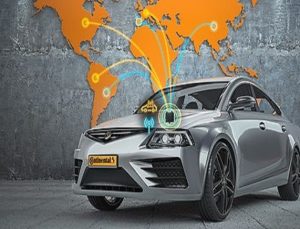
- Chairman of Continental’s Executive Board Dr. Elmar Degenhart: “Environmentally efficient and socially accepted technologies are the key ingredients for a healthy mobility ecosystem”
- Production successes for the lighter, fully integrated electric axle drive, autonomous driving systems and 5G connectivity
- Technological expertise in the service of society: Vision Zero – the vision of zero-accident driving and CO2-neutral mobility
In the run-up to the Frankfurt Motor Show IAA in September 2019, technology company Continental will be presenting numerous innovations that reflect the three major trends of the industry summit, all under the tagline of “Mobility is the Heartbeat of Life.” “Zero accidents, zero emissions and zero stress thanks to smart connectivity and convenience: this is what our pioneering technologies are helping to realize. Technology is our strength and is an area in which Continental has an outstanding level of expertise,” says Dr. Elmar Degenhart, chairman of the Continental Executive Board. In the past year alone, the company has invested more than €3 billion in research and development for the next generation of mobility.
Impressive technology: first fully integrated electric axle drive goes into production
Millions of vehicles are already on the move today with Continental technology. This year will still see major innovations relating to Continental’s automotive trend topics going into production for the first time. The technology company has been able to convince vehicle manufacturers in China and Europe of the performance of Continental’s electric axle drive. The module weighs less than 80 kilograms and includes an electric motor, transmission, power electronics, and motor control. Thanks to the integration, numerous cable connections and plugs can be dispensed with. The fully integrated axle drive thus reduces the weight of electric vehicles by around 20 kilograms.
Further production successes with autonomous driving and 5G connectivity
Another production launch this year is a milestone in the development toward autonomous driving. The autonomous EZ10 shuttle bus from the French company EasyMile is the first to use a Continental radar system that has been specially developed for driverless vehicles and is ready for production. A total of seven radar sensors, each with a range of up to 200 meters, continuously monitor the vehicle environment. With this data, the system adapts its driving strategy, avoids obstructions and therefore prevents dangerous traffic situations on the route ahead at an early stage. Since such autonomous shuttle buses will be mainly used in an urban environment in future, this system protects pedestrians and cyclists in particular.
Furthermore, development of Continental’s first worldwide 5G solution for a vehicle manufacturer is already underway. On this new platform, Continental’s connectivity experts are combining the features of fifth-generation cellular communications with technologies for short-distance radio for direct data exchange between different vehicles and the infrastructure. The vehicles talk to each other faster than ever before, with fewer interruptions. They can warn one other, for example, of accidents behind a bend or traffic jams ahead. Here, too, Continental is integrating previously separate functions, reducing the vehicle’s weight. This represents an important contribution to the environmental efficiency of vehicles and increased road safety.
In the development phase: language assistants with natural speech in the car
One result of Continental research is intuitively designed operating systems. Simple communication between the driver and the vehicle with the aid of an intelligent voice-activated digital companion and three-dimensional displays increases the acceptance of new vehicle technologies. Continental is working on an adaptive voice-activated digital companion that reacts to natural speech and is precisely adapted to vehicle conditions. This makes operation easier and drivers do not have to take their eyes off the road. This increases attention to traffic, reduces the risk of accidents, and also lets the driver relax.
Another trend-setting concept is connected windows in the car. These can be specifically darkened, for example to avoid glare caused by a low sun. Furthermore, they reduce the energy required for cooling the vehicle interior and simply enhance occupant privacy.
Smart intersections in the smart city: everyone arrives safely
In pilot cities in North America and Asia, Continental is currently exploring the possibilities presented by greater connectivity between all road users. In this project, ordinary traffic intersections have been transformed into highly intelligent test fields equipped with smart sensor technology. Traffic lights and streetlights equipped with sensors exchange data with vehicles in the vicinity to protect pedestrians and cyclists in particular. This technology can, for instance, warn a driver of concealed pedestrians or other more vulnerable road users when turning left. Traffic data from street lamps can ultimately reduce emissions: signal changes at traffic lights can be controlled in such a way as to optimize traffic flow and reduce stationary time at intersections.
Performance, efficiency, driving enjoyment: tailored electric drives for every need
In the run-up to the IAA, Continental is demonstrating its outstanding systems expertise in the field of electric drives by showcasing more exciting innovations. In addition to the fully integrated high-voltage axle drive for large-scale production, the company has developed a new technology for hybrid vehicles. The 48-volt high-power drive system with 30 kilowatts of output means it is now possible to drive even long distances purely with electric power for the first time. Previously, this was only possible using high-voltage drive systems – but not with 48-volt technology. Vehicle manufacturers can therefore now offer new, attractively priced hybrid vehicles worldwide.
Greater safety, greater convenience, greater connectivity – for the benefit of all road users
Continental is setting technological milestones not only in the field of electric drives, but also in the development of autonomous driving, a second major trend at this year’s IAA. This goes hand in hand with the gradual realization of “Vision Zero” – the goal of zero-accident mobility. Powerful in-vehicle sensors form the basis for this technology. Continental is combining new radar and camera sensors with intelligent data processing in the cloud, which supports improved functions for assistance systems. For example, Continental is introducing a predictive stability control system that warns the driver before a curve in the road if the vehicle is traveling too fast for the current road conditions and automatically brakes, if necessary, to adjust the vehicle’s speed. This too ensures greater safety and convenience.


















